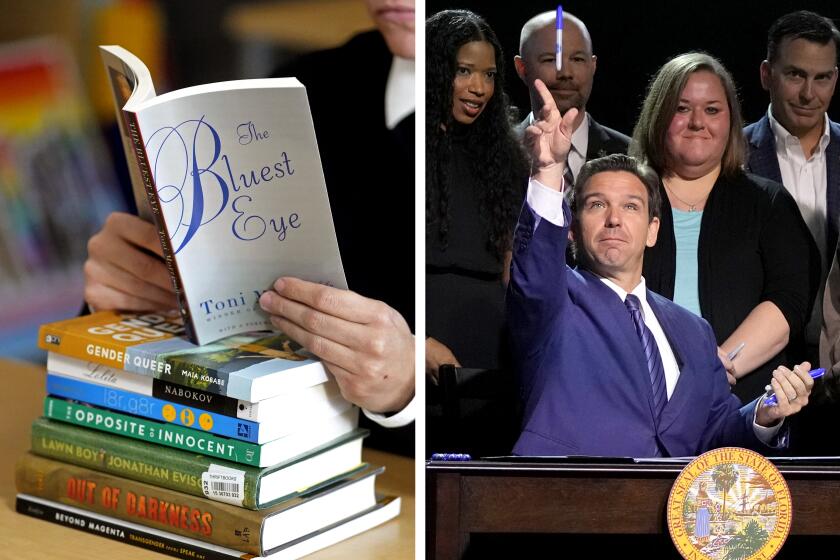Elizabeth Gilbert criticized for ‘wrongheaded’ decision to pull Russia-set novel

- Share via
The bestselling author of “Eat, Pray, Love” is pulling her forthcoming book from publication after facing online backlash, which is baffling the literary community.
Elizabeth Gilbert said Monday that she has removed her upcoming release “The Snow Forest” from its publication schedule indefinitely out of respect for victims of the ongoing war in Ukraine.
“Last week I announced the upcoming publication of my most recent book called ‘The Snow Forest,’” she began the video posted to social media on Monday. Gilbert set the novel in mid-20th century Siberia and it followed a group of people who removed themselves from society to resist the Soviet government and industrialization.
“But over the course of this weekend, I have received an enormous, massive outpouring of reactions and responses from my Ukrainian readers expressing anger, sorrow, disappointment and pain about the fact that I would choose to release a book into the world right now — any book, no matter what the subject of it is — that is set in Russia,” Gilbert continued.
Elizabeth Gilbert, author of the bestselling 2006 memoir “Eat, Pray, Love,” will release a novel next year, titled “City of Girls.”
“And I want to say that I have heard these messages and read these messages and I respect them. And as a result, I’m making a course correction. And I’m removing the book from its publication schedule.
“It is not the time for this book to be published. And I do not want to add any harm to a group of people who have already experienced, and who are all continuing to experience, grievous and extreme harm. So that is the choice that I have made,” she said.
The announcement of the novel, originally set to publish in February 2024 — a month that would mark the second anniversary of the Russian invasion of Ukraine — angered Gilbert’s Ukrainian readers, who accused the author of painting a sympathetic portrait of Russians while ignoring Ukrainian ecocide and genocide.
Putin believes he can outlast the West, even as U.S., Europe show robust support, unity after a year of conflict
When Gilbert announced its publication last week, she shared that she’d written the novel in isolation while living in the middle of nowhere during the first year of the COVID-19 pandemic.
Distanced from culture and humanity, Gilbert was inspired by the idea of being far removed from society, which reminded her of an article she’d read years before about a family that hid in the Siberian wilderness for half a century, devoid of human contact. This planted the seed that would later grow into “The Snow Forest,” she said.
“This is a book that is going to take you into the deepest realms of the Siberian taiga,” Gilbert said, “into the heart and mind of an extraordinary girl born into that world, a girl of great spiritual and creative talent raised far, far, far from everything that we call normal.”
By the time Gilbert announced that she’d decided to pull the book from publication it had already received hundreds of one-star reviews on Goodreads, slamming both the novel’s Russian setting and characters.
While her decision to indefinitely halt publication was applauded by many on social media, it disappointed others, who called Gilbert’s decision self-censorship and a dangerous precedent to set for authors and artists.
“The idea that a novel about a family fleeing religious persecution from Communists is in any way ‘pro’ Russia is not only absurd — it’s also the exact same argument of potential ‘harm’ wielded by the crusading book banners in American schools,” novelist Leigh Stein wrote for UnHerd. “But more importantly, her self-cancellation sets a dangerous precedent for authors who lack her wealth, career stability, and clout.”
“If writers have to participate in the creator economy to earn a living in this industry, what happens when their audience demands a product recall? A novel can take many years to write; there’s no way to predict whether you’ll sell it to a publisher, let alone predict how geopolitics will impact the public reaction to your work. If we can’t stomach novels set in countries that have dark and ugly stains on their records, I have bad news for anyone writing fiction about America,” Stein concluded.
PEN America and publisher Penguin Random House filed a federal suit against Escambia County School District over its removal of books from school libraries.
On Monday, Suzanne Nossel, the chief officer of the free-speech advocacy group PEN America, issued a statement obtained by The Times responding to Gilbert’s preemptive and “wrongheaded” decision.
“It is regrettable that Elizabeth Gilbert felt it necessary to delay the publication of a novel set in Russia. Ukrainians have suffered immeasurably, and Gilbert’s decision in the face of online outcry from her Ukrainian readers is well-intended,” Nossel said. “But the idea that, in wartime, creativity and artistic expression should be preemptively shut down to avoid somehow compounding harms caused by military aggression is wrongheaded. The timing of the uproar, right after Gilbert announced the forthcoming publication, makes clear that those objecting have not yet had a chance to read or judge the work itself.
“The publication of a novel set in Russia should not be cast as an act exacerbating oppression. Fiction and culture are essential to supporting mutual understanding and unleashing empathy. The choice of whether to read Gilbert’s book lies with readers themselves, and those who are troubled by it must be free to voice their views. We hope Gilbert might reconsider and we urge others to rally around the on-time publication of her book, and the principle that literature and creativity must not become a casualty of war.”
Gilbert’s publisher, Riverhead Books, did not immediately respond to The Times’ request for comment.
More to Read
The biggest entertainment stories
Get our big stories about Hollywood, film, television, music, arts, culture and more right in your inbox as soon as they publish.
You may occasionally receive promotional content from the Los Angeles Times.














